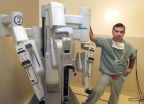(Press-News.org) A team of Scripps Research Institute scientists has found a key biological mechanism underpinning the transition to alcohol dependence. This finding opens the door to the development of drugs to manage excessive alcohol consumption.
"Our focus in this study, like much of our lab's research, was to examine the role of the brain's stress system in compulsive alcohol drinking driven by the aversive aspects of alcohol withdrawal," said Scripps Research Associate Professor Marisa Roberto, Ph.D., senior author of the study.
"A major goal for this study," added Research Associate Nicholas Gilpin, Ph.D., the paper's first author, "was to determine the neural circuitry that mediates the transition to alcohol dependence."
In the new research, published in the June 1, 2011 issue of the journal Biological Psychiatry, the Scripps Research scientists demonstrated the key role of a receptor —a structure that binds substances, triggering certain biological effects—for neuropeptide Y in a part of the brain known as the central amygdala. The amygdala, a group of nuclei deep within the medial temporal lobes, performs an important role in the processing and memory of emotional reactions.
"We've known for quite some time that neuropeptide Y is an endogenous [naturally occurring] anti-stress agent," says Markus Heilig, clinical director of the National Institute of Alcohol Abuse and Alcoholism (NIAAA). "We've also known that development of alcohol dependence gives rise to increased sensitivity to stress. This paper elegantly and logically brings these two lines of research together. It supports the idea that strengthening neuropeptide Y transmission in the amygdala would be an attractive treatment for alcoholism. The challenge remains to develop clinically useful medications based on this principle."
Discovering the Circuitry
Building on Gilpin's previous work on neuropeptide Y, in the new project, Gilpin, Roberto, and colleagues observed the effects of the administration neuropeptide Y in the central amygdala on alcohol drinking in rats. Alcohol-dependent rats were allowed to press levers for ethanol and water during daily withdrawal from chronic alcohol exposure.
"Normally, the transition to alcohol dependence is accompanied by gradually escalating levels of alcohol consumption during daily withdrawals," Gilpin explained. "The aim of this protocol was to examine whether neuropeptide Y infusions during daily withdrawals would block this escalation of alcohol drinking."
The scientists report a suppression of alcohol consumption with chronic neuropeptide Y infusions and detailed some of the neurocircuitry involved. Ethanol normally produces robust increases in inhibitory GABAergic transmission—GABA is another neurotransmitter—in the central amygdala, but this effect is blocked and reversed by neuropeptide Y.
Gilpin notes the scientists were surprised at one aspect of the findings—the role of a subset of neuropeptide Y receptors known as Y2 receptors. "Previous behavioral evidence suggested that antagonism of Y2 receptors in whole brain suppresses alcohol drinking, similar to the effects of neuropeptide Y," he said. "However, our data suggest that Y2 receptor blockade in central amygdala might actually increase alcohol drinking, presumably by affecting pre-synaptic release of GABA. These data also suggest that antagonism of post-synaptic Y1 receptors in central amygdala provides a viable pharmacotherapeutic strategy, a hypothesis supported by previous work from other labs."
Two additional aspects of the findings are worth noting, Roberto says. First, repeated neuropeptide Y administration not only blocked the development of excessive alcohol consumption in dependent rats, but also tempered the moderate increase in alcohol consumption following periods of abstinence in non-dependent rats. Second, neuropeptide Y exhibited long-term efficacy in suppressing alcohol self-administration, highlighting the potential of neuropeptide Y treatments for a clinical setting.
###
In addition to Roberto and Gilpin, authors of this paper, titled "Neuropeptide Y Opposes Alcohol Effects on GABA Release in Amygdala and Blocks the Transition to Alcohol Dependence" and scheduled to appear in the June 1, 2011 print edition of Biological Psychiatry, include Kaushik Misra, Melissa Herman, Maureen Cruz, and George Koob, all of Scripps Research. See http://www.ncbi.nlm.nih.gov/pubmed/21459365 .
This project was supported by the National Institutes of Health's National Institute on Alcohol Abuse and Alcoholism, and the Pearson Center for Alcoholism and Addiction Research at Scripps Research.
About The Scripps Research Institute
The Scripps Research Institute is one of the world's largest independent, non-profit biomedical research organizations. Scripps Research is internationally recognized for its discoveries in immunology, molecular and cellular biology, chemistry, neuroscience, and vaccine development, as well as for its insights into autoimmune, cardiovascular, and infectious disease. Headquartered in La Jolla, California, the institute also includes a campus in Jupiter, Florida, where scientists focus on drug discovery and technology development in addition to basic biomedical science. Scripps Research currently employs about 3,000 scientists, staff, postdoctoral fellows, and graduate students on its two campuses. The institute's graduate program, which awards Ph.D. degrees in biology and chemistry, is ranked among the top ten such programs in the nation. For more information, see www.scripps.edu.
END
In the treeless, flat Prairie, you'd think a city would provide a good home for bats who like to snuggle up and roost in trees and buildings. But researchers at the University of Calgary made the surprising discovery that the urban landscape is far from ideal for these animals.
"I was really surprised," says Dr. Joanna Coleman, a sessional lecturer and recent PhD graduate in biological sciences at the University of Calgary and lead author of the study. "I fully expected bats to benefit from the expected increase in availability of roosts and food – insects -- in the city. ...
PHILADELPHIA — Engineering structures on the smallest possible scales — using molecules and individual atoms as building blocks — is both physically and conceptually challenging. An interdisciplinary team of researchers at the University of Pennsylvania has now developed a method of computationally selecting the best of these blocks, drawing inspiration from the similar behavior of proteins in making biological structures.
The team was led by postdoctoral fellow Gevorg Grigoryan and professor William DeGrado of the Department of Biochemistry and Biophysics in Penn's Perelman ...
The #1 ranked WordPress Training company announces they are providing private 1-ON-1 WordPress Training to individuals wanting t tailor their wordpress training needs to their own pace and also focus the training on THEIR OWN WEBSITES.
That's right, if you're looking for wordpress training from WP professionals now you can have the training or help you require tailored to YOUR needs or have the wordpress training professional assist you in teaching you how to customize or set-up YOUR specific website.
Aperio has found through it's over 1,500 students whom have taken ...
Researchers at the University of California, San Diego, the Medical University of South Carolina and American Life Science Pharmaceuticals of San Diego have demonstrated that oral administration of a cysteine protease inhibitor, E64d, not only reduces the build-up of β-amyloid (Aβ) in the brains of animal models for Alzheimer's disease, but also results in a substantial improvement in memory deficit.
A paper detailing the findings has been published as an early online version and is scheduled for publication in the September 6 issue of the Journal of Alzheimer's ...
Product designers harness time-consuming procedures in prototype construction. Only then are they able to assess the results of their work in a comprehensive manner. In a three-dimensional model world, they are able to do so instantly and can experience how the product fits into its natural surroundings. Design alterations can be visualized immediately, saving time and cutting the costs associated with the development process.
Up to now, the so-called CAVE has been used. This consists of between three and six projection surfaces that create a walk-in space. Video projectors ...
The America Chamber of Commerce is pleased to announce that Jack Miller, President and CEO; Ely Miller, EVP and COO; Lorin Morar, VP Software Development were elected to the Executive Board which offers all local, regional, national and international companies to create a free user account at AmericaChamber.com.
About America Chamber
America Chamber was created to drive unique traffic between entrepreneurs throughout America so that they can do business with each other on a local, regional, national and international basis. We are neither a buyers club nor just a website ...
(Garrison, NY) In a feature article in The New Republic, Daniel Callahan and Sherwin Nuland propose a radical reinvention of the American medical system requiring new ways of thinking about living, aging, and dying. They argue that a sustainable—and more humane— medical system in the U.S. will have to reprioritize to emphasize public health and prevention for the young, and care not cure for the elderly.
An interesting twist on their argument, which would aim to bring everyone's life expectancy up to an average age of 80 years but give highest priority for medical treatment ...
Cutting back on sleep drastically reduces a healthy young man's testosterone levels, according to a study published in the June 1 issue of the Journal of the American Medical Association (JAMA).
Eve Van Cauter, PhD, professor in medicine and director of the study, found that men who slept less than five hours a night for one week in a laboratory had significantly lower levels of testosterone than when they had a full night's sleep. Low testosterone has a host of negative consequences for young men, and not just in sexual behavior and reproduction. It is critical in building ...
This release is available in Spanish.
Laboratory hamsters that were fed rations spiked with blueberry peels and other blueberry-juice-processing leftovers had better cholesterol health than hamsters whose rations weren't enhanced with blueberries. That's according to a study led by U.S. Department of Agriculture (USDA) chemist Wallace H. Yokoyama.
Yokoyama pointed out that further research is needed to confirm whether the effects observed in hamsters hold true for humans. He works at the Western Regional Research Center operated in Albany Calif., by the Agricultural ...
AUGUSTA, Ga. – A facelift incision and robotics can help surgeons safely remove a portion of a diseased thyroid from some patients without the characteristic neck scar.
Georgia Health Sciences University surgeons developed the technique utilizing the remote access capabilities of robots, experience gained from another no-neck-scar approach through the armpit and earlier success removing the largest salivary gland from the lower jaw region.
"It is outpatient, it doesn't require a surgical drain and it has the advantage of no neck scar," said Dr. David Terris, Chairman ...



